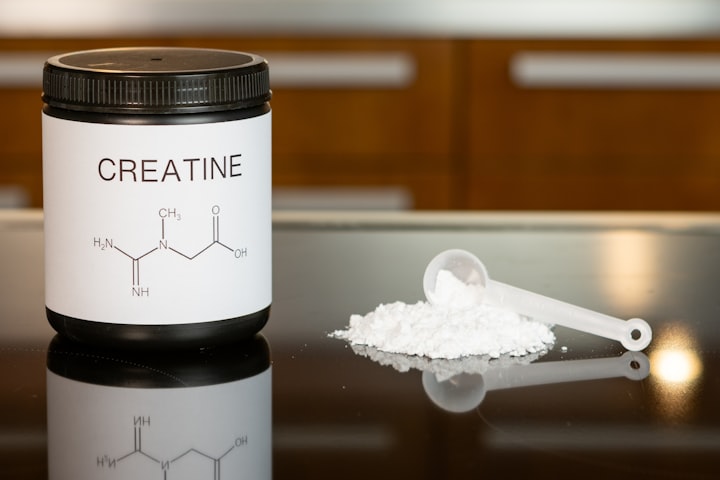Creatine's Secret Benefit..
Creatine has gained popularity in the fitness world as a supplement for muscle growth and performance enhancement. However, its benefits extend beyond the realm of physical fitness. In this article, we will explore the various aspects of creatine and its potential impact on cognitive function and overall well-being.

We're about to learn something that we've never heard before! There's this study that I ran across during my larger investigation that one was something out of a science fiction film and two showed something unique about creatine that as far as I know, no one has ever discussed about creatine before.
First, the researchers recruited participants who were willing to have their oxygen supply cut off they straight up choked them to death. Kidding of course, at least partly because they didn't choke them out MMA style but they did have them wear gas masks that control the amount of oxygen that they were able to consume so they effectively were oxygen deprived on purpose. We can even see that the SPO2 there on the left is their blood oxygen level. They drop from around 100% saturation to around 80% which is a substantial drop what's also interesting is that their heart rate increased, which is a side note but if you would like to guess why do you think that their heart rate increased? There are a few plausible explanations but post your hypothesis in the comments and I'll pin the comment that gets the right answer anyway. We're not here to discuss heart rate we're here to discuss creatine so one group of participants consumed Creatine for several days leading up to the experiment and the other group in a crossover design consumed a placebo non-c creatine drink that tasted identical to the two groups of data were. Then compared against one another across a variety of tests but it's this one test in particular that got me really excited as a matter of fact I was visiting my grandparents when I read this study and I ended up talking my grandma's ear off about all the possibilities. I think she was more confused leaving this one-sided conversation than when she was sucked into it. Don't worry! I promise I'll do better with you the experiment was a cortical motor excitability test meaning the researchers are measuring the excitability or activation of neurons which are the nerve cells in your body that connect the brain stem to the muscle cells the greater the excitement the greater the response of the neurons if we look at the placebo condition we can see that as the researchers stimulate the nerves more shown on the horizontal axis the excitability increases shown on the vertical axis however comparing the normal oxygen condition meaning no oxygen deprivation versus hypoxia which is oxygen deprivation there's no big difference.
However, when looking at the creatine group there is a clear change in the hypoxic condition oxygen experienced increased excitability of the neurons. This is further evidenced when comparing the placebo versus the creatine groups. Here the total difference is about five-fold increased excitability in the creatine condition when the body is low on oxygen so you might be wondering why this matters. That's a good question. Well for one, if you're ever in a horror movie and the Killer is strangling you. You'll likely be able to think more sharply and fight back more vigorously assuming that you've been supplementing creatine of course. If you haven't your last thoughts might be why didn't I listen to physic well don't feel too bad you probably would have been screwed either way. But really, why does it matter well greater excitability implies better performance and more activity Pro nervous system this data comes from severe situations but most of us don't go around depriving our brain of oxygen. So the direct application is low however this isn't the only study that I found that shows creatine's neural benefits.
I'll describe this in more detail shortly because I'd like for us to spend a bit more time on the mechanisms. It isn't all about the data it's about also understanding the mechanisms behind set data what is creatine doing to our nervous system you may or may not already know this depending on how awake you were during biology class but your neurons again are your nerves cells send signals from one end of the cell to the other through the exchange of ions to describe that more effectively your neuron receives a signal from another neuron. Through what are known as dendrites those are the top section of the cell if enough activating signals are sensed by the neuron. These signals are then aggregated in a manner of speaking at a location called the axon hilic located here.
Just before this lengthy section called the axon if the cell is activated to continue the signal it sends the signal down the axon now. Here is where creatine plays a role when the signal is propagating from the top to the end of the axon there's. This exchange of ions in and out of the cell means that the axon is in a polarized State meaning that certain ions like potassium are found readily inside of the axon and certain other ions like sodium are found outside of the cell when the signal reaches this section of the axon Gates or channels open to allow the exchange of ions. As the sodium levels are much higher the influx of sodium into the cell leads the cell to become extremely positively charged because sodium is a positive ion in doing so that section of the cell has now depolarized and the signal moves on to the next section to repeat the process until it reaches the end of the axon. Where it eventually triggers the axon to release molecules that activate the next cell and follow the same pattern. This is how we communicate neural inputs and communicate neurally across our entire body however when the cell has depolarized it has to readjust back to a polarized State. Meaning it needs to kick out the sodium that came in and equilibrate a number of other things in preparation for the next activation in doing so it uses these massive pumps that literally kick out sodium and suck up potassium that's been displaced eventually the cell enters back into its polarized State. This is called the resting membrane potential
How does any of this relate to creatine?
You need to react quickly to something on a cellular level the faster that you can equilibrate back to the resting potential the faster that you can activate again think of it like a a Formula 1 racing pit crew. The faster that you can work on the car the faster it gets out of the gate. Unfortunately, those massive sodium-potassium pumps require large amounts of cellular energy known as ATP so if you're stimulating the cell over and over the stored cellular energy then drops from continuously having to repolarize now since oxygen levels are also lower that means that the mitochondria. The PowerHouse of the cell can't generate energy as well because mitochondria within your cells require oxygen to generate ATP cell energy that's a discussion for another time though the point is that your neurons require high concentrations of ATP yet. When they proverbially turn to the mitochondria within the mitochondria are starved of the necessary oxygen to generate ATP. This is where creatine is thought to step in because higher creatine stores in the cell allow more creatine to be phosphorated which means that a tag is attached to the creatine molecule. It then donates to spent energy molecules called ADP.
ADP can then be turned back into a TP independent of oxygen and the mitochondria creating a reservoir of energy through creatine so creatine helps preserve the energy state of the cell and allows more excitations activations of the cell to occur per moment. Since it allows the sodium-potassium pumps to remain active for longer how incredible is that okay but that still doesn't explain how applicable this information is because who is going to be oxygen-deprived other than people who are being strangled and people living in the mountains well I've been using this study as an extreme example but as I've discussed with the physionic. Insiders which if you haven't joined yet you're missing out because I go into far more detail there on really everything and it comes with a bunch of perks with applicable takeaways and more anyway the point being I discussed some of these intricacies there and creatine does not only have a benefit in people starved of oxygen but likely in most cognitively stressful situations. We shouldn't be thinking about creatine from a muscle-centric perspective only.





Comments
There are no comments for this story
Be the first to respond and start the conversation.